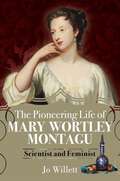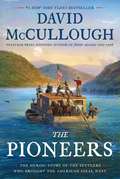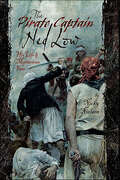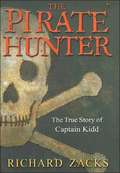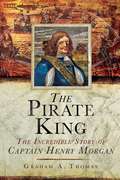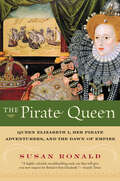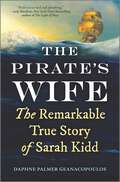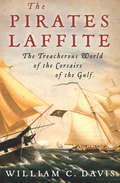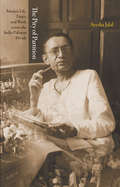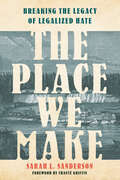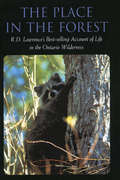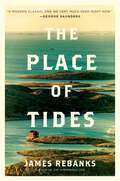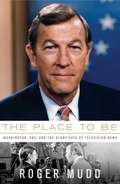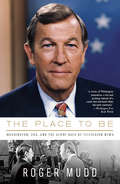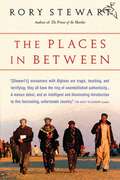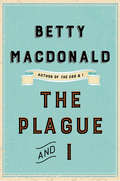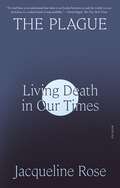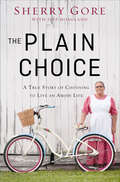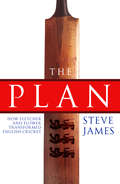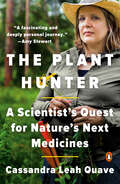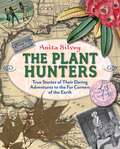- Table View
- List View
The Pioneering Life of Mary Wortley Montagu: Scientist and Feminist
by Jo WillettThe first biography to look at the early feminist and radical Mary Wortley Montagu, who successfully introduced Britain to the inoculation against the smallpox virus.300 years ago, in April 1721, a smallpox epidemic was raging in England. Lady Mary Wortley Montagu knew that she could save her 3-year-old daughter using the process of inoculation. She had witnessed this at first hand in Turkey, while she was living there as the wife of the British ambassador. She also knew that by inoculating - making her daughter the first person protected in the West - she would face opposition from doctors, politicians and clerics. Her courageous action eventually led to the eradication of smallpox and the prevention of millions of deaths. But Mary was more than a scientific campaigner. She mixed with the greatest politicians, writers, artists and thinkers of her day. She was also an important early feminist, writing powerfully and provocatively about the position of women. She was best friends with the poet Alexander Pope. They collaborated on a series of poems, which made her into a household name, an ‘It Girl.' But their friendship turned sour and he used his pen to vilify her publicly. Aristocratic by birth, Mary chose to elope with Edward Wortley Montagu, whom she knew she did not love, so as to avoid being forced into marrying someone else. In middle age, her marriage stale, she fell for someone young enough to be her son - and, unknown to her, bisexual. She set off on a new life with him abroad. When this relationship failed, she stayed on in Europe, narrowly escaping the coercive control of an Italian con man. After twenty-two years abroad, she returned home to London to die. The son-in-law she had dismissed as a young man had meanwhile become Prime Minister.
The Pioneers
by Marie Gorsline Douglas W. GorslineDepicts the hardships of the pioneers as they made their way westward from Missouri across the prairie and over the mountains to the Pacific coast.
The Pioneers: The Heroic Story Of The Settlers Who Brought The American Ideal West
by David McCulloughPulitzer Prize–winning historian David McCullough rediscovers an important and dramatic chapter in the American story—the settling of the Northwest Territory by dauntless pioneers who overcame incredible hardships to build a community based on ideals that would come to define our country. <P><P> As part of the Treaty of Paris, in which Great Britain recognized the new United States of America, Britain ceded the land that comprised the immense Northwest Territory, a wilderness empire northwest of the Ohio River containing the future states of Ohio, Indiana, Illinois, Michigan, and Wisconsin. A Massachusetts minister named Manasseh Cutler was instrumental in opening this vast territory to veterans of the Revolutionary War and their families for settlement. Included in the Northwest Ordinance were three remarkable conditions: freedom of religion, free universal education, and most importantly, the prohibition of slavery. In 1788 the first band of pioneers set out from New England for the Northwest Territory under the leadership of Revolutionary War veteran General Rufus Putnam. They settled in what is now Marietta on the banks of the Ohio River. <P><P> McCullough tells the story through five major characters: Cutler and Putnam; Cutler’s son Ephraim; and two other men, one a carpenter turned architect, and the other a physician who became a prominent pioneer in American science. They and their families created a town in a primeval wilderness, while coping with such frontier realities as floods, fires, wolves and bears, no roads or bridges, no guarantees of any sort, all the while negotiating a contentious and sometimes hostile relationship with the native people. Like so many of McCullough’s subjects, they let no obstacle deter or defeat them. <P><P> Drawn in great part from a rare and all-but-unknown collection of diaries and letters by the key figures, The Pioneers is a uniquely American story of people whose ambition and courage led them to remarkable accomplishments. This is a revelatory and quintessentially American story, written with David McCullough’s signature narrative energy.
The Pippa Guide: Live Your Best Life
by Pippa O'Connor Ormond"I think anyone can do anything they want to do. I really believe that."Style icon and savvy businesswoman Pippa O'Connor Ormond believes that anything is achievable if you put your mind to it.In this honest and revealing guide to modern life, Pippa shares some of her personal moments, experiences and life lessons that have shaped her into the person she is today. From excelling at work, to making your house a home, styling your wardrobe and perfecting your beauty routine, nurturing family and friendships while promoting self-care, Pippa will reveal her most valuable tips for bringing positivity and happiness into your life."I'm always practising gratitude. No matter what you have in life, once you are grateful for it, it manifests more. 100%."
The Pirate Captain Ned Low: His Life & Mysterious Fate
by Nicky NielsenEdward ‘Ned’ Low’s career in piracy began with a single gunshot. While working on a logging ship in the Bay of Honduras the quick-tempered Ned was provoked by the ship’s captain. He responded by grabbing a musket and inciting a mutiny. Then the London-born sailor and a dozen of his crewmates held a council, stitched a black flag and voted to make war against the whole world preying on ships from any nation, flying any flag. Low’s name became synonymous with brutality and torture during the 1720s as he cut a swathe of destruction from the shores of Nova Scotia to the Azores, the coast of Africa and throughout the Caribbean. Ned Low’s life was one of failed redemption: a thief from childhood who briefly rose in the world after moving to America, only to fall again lower and harder than before. He was feared even by his own crew, and during his life on the wrong side of the law he became infamous for his extreme violence, fatalistic behaviour, and became perhaps one of the best examples of why pirates were classed in Admiralty Law as hostis humani generis: the common enemies of all mankind.
The Pirate Hunter: The True Story of Captain Kidd (Adventure Ser.)
by Richard ZacksEverybody knows the legend of Captain Kidd, America's most ruthless buccanneer. Few people realize that the facts of his life make for a much better tale. Kidd was actually a tough New York sea captain hired to chase pirates, a married war hero whose secret mission took a spectacularly bad turn.This harrowing tale traces Kidd's voyages in the 1690s from his home near Wall Street to Whitehall Palace in London, from the ports of the Caribbean to a secret pirate paradise off Madagascar. Author Richard Zacks, during his research, also unearthed the story of a long forgotten rogue named Robert Culliford, who dogged Kidd and led Kidd's crew to mutiny not once but twice. The lives of Kidd and Culliford play out like an unscripted duel: one man would hang in the harbor, the other would walk away with the treasure. Filled with superb writing and impeccable research, The Pirate Hunter is both a masterpiece of historical detective work and a ripping good yarn, and it delivers something rare: an authentic pirate story for grown-ups.
The Pirate King: The Incredible Story of the Real Captain Morgan
by Graham A. ThomasA compelling account of history's most famous pirate. The Pirate King is the compelling true story of a Welshman who became one of the most ruthless and brutal buccaneers of the golden age of piracy. The inspiration for dozens of fictionalized pirates in film, television, and literature--as well the namesake of one of the world’s most popular rum brands--Captain Sir Henry Morgan was matchless among pirates and privateers. Unlike most of his contemporaries, he was not hunted down and killed or captured by the authorities. Instead he was considered a hero in England and given a knighthood and eventually was made governor of Jamaica. As Graham Thomas reveals in this fresh biography of this complex and intriguing character, Morgan was an exceptional military leader whose prime motivation was to amass as much wealth as he could by sacking and plundering settlements, towns, and cities up and down the Spanish Main. Featuring graphic accounts of Morgan’s exploits, eventually leading to an unparalleled rise to power and legitimacy, The Pirate King is a riveting read sure to become a key text in pirate literature. Thomas dispels myths and separates fact from fiction as he presents an intriguing new portrait of one of history’s most compelling figures. Skyhorse Publishing, as well as our Arcade imprint, are proud to publish a broad range of books for readers interested in history--books about World War II, the Third Reich, Hitler and his henchmen, the JFK assassination, conspiracies, the American Civil War, the American Revolution, gladiators, Vikings, ancient Rome, medieval times, the old West, and much more. While not every title we publish becomes a New York Times bestseller or a national bestseller, we are committed to books on subjects that are sometimes overlooked and to authors whose work might not otherwise find a home.
The Pirate Queen: Queen Elizabeth I, Her Pirate Adventurers, and the Dawn of Empire
by Susan Ronald“A highly colorful, swashbuckling read, one that will give you new respect for Britain’s first Elizabeth.” —Seattle TimesAn illuminating revisionist biography about Queen Elizabeth I and her merchant-adventurers who terrorized the seas, extended the Empire, and amassed great wealth for the throne.Extravagant, whimsical, and hot-tempered, Elizabeth was the epitome of power, both feared and admired by her enemies. Dubbed the "pirate queen" by the Vatican and Spain's Philip II, she employed a network of daring merchants, brazen adventurers, astronomer philosophers, and her stalwart Privy Council to anchor her throne—and in doing so, planted the seedlings of an empire that would ultimately cover two-fifths of the world.In The Pirate Queen, historian Susan Ronald offers a fresh look at Elizabeth I, relying on a wealth of historical sources and thousands of the queen's personal letters to tell the thrilling story of a visionary monarch and the swashbuckling mariners who terrorized the seas to amass great wealth for themselves and the Crown.
The Pirate's Wife: The Remarkable True Story of Sarah Kidd
by Daphne Palmer GeanacopoulosThe dramatic and deliciously swashbuckling story of Sarah Kidd, the wife of the famous pirate Captain Kidd, charting her transformation from New York socialite to international outlaw during the Golden Age of PiracyCaptain Kidd was one of the most notorious pirates to ever prowl the seas. But few know that Kidd had an accomplice, a behind-the-scenes player who enabled his plundering and helped him outpace his enemies. That accomplice was his wife, Sarah Kidd, a well-to-do woman whose extraordinary life is a lesson in reinvention and resourcefulness. Twice widowed by twenty-one and operating within the strictures of polite society in seventeenth- and eighteenth-century New York, Sarah secretly aided and abetted her husband, fighting alongside him against his accusers. More remarkable still was that Sarah not only survived the tragedy wrought by her infamous husband&’s deeds, but went on to live a successful and productive life as one of New York&’s most prominent citizens. Marshaling in newly discovered primary-source documents from archives in London, New York and Boston, historian and journalist Daphne Palmer Geanacopoulos reconstructs the extraordinary life of Sarah Kidd, uncovering a rare example of the kind of life that pirate wives lived during the Golden Age of Piracy. A compelling tale of love, treasure, motherhood and survival, this landmark work of narrative nonfiction weaves together the personal and the epic in a sweeping historical story of romance and adventure.
The Pirates Laffite: The Treacherous World of the Corsairs of the Gulf
by William C. DavisAn &“engrossing and exciting&” account of legendary New Orleans privateers Pierre and Jean Laffite and their adventures along the Gulf Coast (Booklist, starred review). At large during the most colorful period in New Orleans&’ history, from just after the Louisiana Purchase through the War of 1812, privateers Jean and Pierre Laffite made life hell for Spanish merchants on the Gulf. Pirates to the US Navy officers who chased them, heroes to the private citizens who shopped for contraband at their well-publicized auctions, the brothers became important members of a filibustering syndicate that included lawyers, bankers, merchants, and corrupt US officials. But this allegiance didn&’t stop the Laffites from becoming paid Spanish spies, disappearing into the fog of history after selling out their own associates. William C. Davis uncovers the truth about two men who made their names synonymous with piracy and intrigue on the Gulf.
The Pit and the Trap: A Chronicle of Survival
by Leyb Rochman Sheila Friedling O. Kohn... During the Holocaust, total darkness reigned in the world. The Jew reached his point of utter degradation: an insect to be stomped out. Rochman's story has a different twist from most other Holocaust literature, however. ... Though it stays scrupulously close to the facts, complete with accurate names and dates, "The Pit & the Trap" is a book of hope. Not of facile hope or of saccharine optimism but of a tempered faith in humankind. LEYB ROCHMAN (1918-1978) was born in Minsk-Mazowiecki, some twenty-five miles from Warsaw. As a young man, he was close to Porisover Hasidim and studied in the Amudei Torah yeshiva in Warsaw. Prior to the war he was a journalist for the Warsaw Yiddish press. The Germans occupied Minsk-Mazowiecki on 13 September 1939 and established a ghetto there in October 1940. Rochman was married in the ghetto, shortly before escaping its final liquidation. While still in hiding, he began to keep a record of his experiences which he completed in Switzerland soon after the war. It was published in Paris under the title And in Your Blood Shall You Live and won the Hoffer-Leyb Prize awarded by the World Congress for Jewish Culture in 1949. Everything contained in this harrowing chronicle actually happened. Except for Froiman, who now lives in the USA, all those who hid together with the author settled in Israel after the War. Itche-Konyak, the sixteen-year-old boy from Kaluszyn, was killed fighting in the War of Independence. Rochman's daughter, Rivka Miriam, is a noted artist and Hebrew poet; his son Yehoshua, is a concert violinist.
The Pity of Partition: Manto's Life, Times, and Work across the India-Pakistan Divide (The Lawrence Stone Lectures #5)
by Ayesha JalalA history of partition seen through the life and fiction of one of the subcontinent's most important modern writersSaadat Hasan Manto (1912-1955) was an established Urdu short story writer and a rising screenwriter in Bombay at the time of India's partition in 1947, and he is perhaps best known for the short stories he wrote following his migration to Lahore in newly formed Pakistan. Today Manto is an acknowledged master of twentieth-century Urdu literature, and his fiction serves as a lens through which the tragedy of partition is brought sharply into focus. In The Pity of Partition, Manto's life and work serve as a prism to capture the human dimension of sectarian conflict in the final decades and immediate aftermath of the British raj.Ayesha Jalal draws on Manto's stories, sketches, and essays, as well as a trove of his private letters, to present an intimate history of partition and its devastating toll. Probing the creative tension between literature and history, she charts a new way of reconnecting the histories of individuals, families, and communities in the throes of cataclysmic change. Jalal brings to life the people, locales, and events that inspired Manto's fiction, which is characterized by an eye for detail, a measure of wit and irreverence, and elements of suspense and surprise. In turn, she mines these writings for fresh insights into everyday cosmopolitanism in Bombay and Lahore, the experience and causes of partition, the postcolonial transition, and the advent of the Cold War in South Asia.The first in-depth look in English at this influential literary figure, The Pity of Partition demonstrates the revelatory power of art in times of great historical rupture.
The Place We Make: Breaking the Legacy of Legalized Hate
by Sarah L. SandersonA thoughtful investigation into the incredible true story of a Black man convicted and exiled under the Oregon Exclusion Law in 1851—and a contemporary White woman wrestling with racism and faith after learning she&’s a descendant of two men who assisted in the exile.&“A beautiful rendering of an ugly history. A worthy read.&”—Chanté Griffin, advocate, journalist, and authorMoving back to the outskirts of Portland, called the &“Whitest city in America,&” prompted Sarah&’s curiosity about the colonization of the West, her ancestors, and the legal exile of a Black man. She examined four city leaders involved in Jacob Vanderpool&’s case—Oregon City&’s founder, the case judge, Jacob&’s accuser, and a local pastor—and the cultural and theological fallout of their decisions. Along the way, Sarah took a hard look at her tendencies, unconscious and deliberate, to ignore the possibility of prejudice in her heart. Vanderpool&’s case proved a fascinating lens on a far bigger story than one trial, illuminating truths to help us all come to honest terms with our past, learn to repent, and contribute to the good of the people and places around us.Journey through this sensitive expedition into the events that remain a thorn under America&’s skin and discover afresh the vast potential of the flawed but endlessly redeemable—human heart.
The Place in the Forest
by R. D. LawrenceA number of years ago, R.D. Lawrence acquired a patch of Ontario wilderness, soon known as "The Place." Here Lawrence and his wife built a cabin and became immersed in studying the ways of the wild. "The Place" was home to a variety of wildlife, from black bears, wolves, beavers and raccoons through to hawks, snapping turtles and singing mice. Lawrence’s desire to learn, fuelled by his keen observation, led to his writing about and photographing life within his small corner of the forest – the result being a warm, witty account of change and survival in the natural world.
The Place of Tides
by James Rebanks“The Place of Tides feels like, not only a modern classic, but one we very much need right now.” –George Saunders From perhaps the preeminent nature writer of our time and the acclaimed author of Pastoral Song and The Shepherd’s Life, a magical work of nonfiction in which James Rebanks reflects on a life-changing summer spent on a remote island off the coast of Norway, where his only companion was an old woman who practiced the ancient tradition of collecting eiderdown from birds that nest on this remarkable landscape each year.We are all in need of lights to follow.One afternoon many years ago, James Rebanks met an old woman on a remote Norwegian island. She lived and worked alone on a tiny rocky outcrop, caring for wild Eider ducks and gathering their down. Hers was a centuries-old trade that had once made men and women rich but had long been in decline. Still, somehow, she seemed to be hanging on.Back at home, Rebanks couldn’t stop thinking about the woman on the rocks. She was fierce and otherworldly—and yet strangely familiar. Years passed. Then, one day, he wrote her a letter, asking if he could return. Bring work clothes, she replied, and good boots, and come quickly: her health was failing. And so he travelled to the edge of the Arctic to witness her last season on the island.This is the story of that season. It is the story of a unique and ancient landscape, and of the woman who brought it back to life. It traces the pattern of her work from the rough, isolated toil of bitter winter to the elation of the endless summer light, when the birds leave behind their precious down for gathering, like feathered gold.Slowly, Rebanks begins to understand that this woman and her world are not what he had previously thought. What began as a journey of escape becomes an extraordinary lesson in self-knowledge and forgiveness.
The Place to Be: Washington, CBS, and the Glory Days of Television News
by Roger MuddFamed journalist and broadcast anchor Roger Mudd recounts his days with CBS and how that news bureau operated during its heady days as a global information leader. From the congressional debate during the passing of the 1964 Civil Rights Act to Mudd's departure from CBS in 1980, he offers an insider's glimpse into the political events of the last half of the twentieth century with an informative, episodic narrative structure. Mudd offers equal doses of humor and meaning with each story of this memoir, which should appeal to anyone who has followed his career through the decades. Annotation ©2008 Book News, Inc., Portland, OR (booknews.com)
The Place to Be: Washington, CBS, and the Glory Days of Television News
by Roger MuddRoger Mudd joined CBS in 1961, and as the congressional correspondent, became a star covering the historic Senate filibuster debate over the 1964 Civil Right Act. Mudd was one of half a dozen major figures in the stable of CBS News broadcasters at time when the networkOCOs standing as a provider of news was at its peak. In "The Place to Be," Mudd tells of how the bureau worked: the rivalries, the egos, the pride, the competition, the ambitions and the gathering frustrations of conveying the world to a national television audience in thirty minutes minus commercials. It is the story of a unique TV news bureau, unmatched in its quality, dedication, and professionalism, that will highlight what TV journalism was once like and what itOCOs missing today.
The Places In Between
by Rory StewartThe New York Times bestselling account of a thirty-six-day walk across Afghanistan, shortly after the fall of the Taliban: “stupendous . . . an instant travel classic” (Entertainment Weekly).In January 2002, Rory Stewart walked across Afghanistan, surviving by his wits, the kindness of strangers, and his knowledge of Persian dialects and Muslim customs. By day he passed through mountains covered in nine feet of snow, hamlets burned and emptied by the Taliban, and communities thriving amid the remains of medieval civilizations. By night he slept on villagers' floors, shared their meals, and listened to their stories of the recent and ancient past. Along the way Stewart met heroes and rogues, tribal elders and teenage soldiers, Taliban commanders and foreign-aid workers. He was also adopted by an unexpected companion—a retired fighting mastiff he named Babur in honor of Afghanistan's first Mughal emperor, in whose footsteps the pair was following.Through these encounters—by turns touching, confounding, surprising, and funny—Stewart makes tangible the forces of tradition, ideology, and allegiance that shape life in this beautiful, beleaguered country.
The Plague and I
by Betty MacDonaldA pre-WW2 American humorist contracts TB and “writes about her seclusion in a way that is painfully, barkingly funny” (Lissa Evans, The Guardian).“Getting tuberculosis in the middle of your life is like starting downtown to do a lot of urgent errands and being hit by a bus. When you regain consciousness you remember nothing about the urgent errands. You can’t even remember where you were going.”Thus begins Betty MacDonald’s memoir of her year in a sanatorium just outside Seattle battling the “White Plague.” MacDonald uses her offbeat humor to make the most of her time in the TB sanatorium—making all of us laugh in the process.“Improbably funny. . . equally remarkable.” ―Steve Donoghue, Open Letters Monthly“Can you imagine writing a whole book about being forbidden to do anything other than lie in bed? But Betty does, and she somehow makes it a riveting chronicle.” ―Lory Widmer Hess, Emerald City Book Review“An appetizing, well-seasoned feast. MacDonald’s sharp, witty observations as she spends almost a year in The Pines Clinic, outside of Seattle, are perfectly pitched . . . with a huge dollop of idiosyncratic humour . . . MacDonald is an impressive and engaging storyteller.” ―Jules Morgan, The Lancet
The Plague and I
by Betty MacdonaldBetty MacDonald had divorced her first husband, (meet him in "The Egg and I," which is available from Bookshare) and had moved back home with her two girls. She was working in an office when the overwhelming fatigue and exhausting cough began. Without much money, she had few choices, which is why she went to The Pines. This biographical book provides us with detailed looks at how tuberculosis was treated during the 1940s and what sanatoriums were like. Other books for adults and children by Betty MacDonald are available from Bookshare.
The Plague: Living Death in Our Times
by Jacqueline RoseA slim, heart-wrenching, and rousing new book from the leading feminist writer Jacqueline Rose.In early 2020, when the COVID-19 pandemic began to infiltrate public consciousness, sales of The Plague, the classic novel by French philosopher Albert Camus, skyrocketed. At the same time, the virus’s toll surged exponentially. Amid the harrowing loss, many sensed a glimmer of possibility—the potential for radical empathy wrought by shared experience—even as the death-dealing divisions of class, race, gender, and citizenship were underscored like never before. We have been through a time of ‘living death’ when, for millions across the globe, untold horror has seemed to infiltrate the very air we breathe.Jacqueline Rose’s trenchant new book unravels recent history via the lives and works of three extraordinary thinkers—Albert Camus, Sigmund Freud, and Simone Weil, each one afflicted by catastrophe. Their politics and private griefs, the depth of their understanding, fling open a window into our present crises. Rose, one of the most insightful thinkers on politics and psychoanalysis alike, has written a story of unusual range, spanning World War II to Russia’s invasion of Ukraine, surging domestic violence to emboldened anti-racist protest, the Spanish influenza to Omicron, Boris Johnson’s deranged optimism to Vladimir Putin’s megalomania. The Plague: Living Death In Our Times enacts a psychic reckoning for our moment and for the future to be forged in its aftermath.
The Plain Choice: A True Story of Choosing to Live an Amish Life
by Sherry Gore Jeff HoaglandRaised in a broken family and emotionally overlooked, Sherry Gore grew up without a solid foundation, a prisoner of her own poor choices, and at times without hope. A series of terrible mistakes left her feeling wrecked and alone and a sudden tragedy threw Sherry into an emotional tailspin too powerful to escape.Sherry hangs by a thread, unable to see how she can go on living, until it happens: on a morning of no particular significance, she walks into a church and BAM the truth of Jesus&’ forgiving love shatters her world and cleaves her life in two: She goes to bed stunned; she wakes up a Christian.Unwilling to return to the darkness of her former life, Sherry attacks her faith head on. Soon the life Sherry Gore remakes for herself and her children as she seeks to follow the teachings of the Bible features head coverings, simple dress, and a focus on Jesus Christ. Only then does she realize, in a fit of excitement, that there are others like her. They are called Amish and Mennonite, and she realizes she has found her people.The plain choice that Sherry makes is not easy – and life still brings unexpected pain and heartache - but it changes everything for her, as she becomes one of the few people on earth to have successfully joined the Amish from the outside. She has found her place. And her story proves that one can return from the darkest depths to the purest light with the power of God.
The Plan: How Fletcher And Flower Transformed English Cricket
by Steve JamesIn 1999, England slumped to a new low in their tumultuous cricket history. Defeat at home by a mediocre New Zealand team saw them fall to the bottom of the world Test rankings, below even Zimbabwe. Yet only just over a decade later, England reached the top. It was a remarkable and profound transformation, brought about largely by two men with an insatiable desire to succeed, Duncan Fletcher and Andy Flower.In The Plan, Steve James tells the story of the renaissance of English cricket from a unique perspective. As the former batting partner of ECB managing director Hugh Morris, a player under Fletcher at Glamorgan and Flower's closest confidant in the press corps, James is the perfect analyst of this period in cricket history. From crucial choices of captain to innovative coaching and a complete overhaul of training and preparation for matches, it is the tale of a refusal to be second best.And in examining Fletcher and Flower's background in Zimbabwe, where James himself played, he uncovers the continental shift behind the turnaround. It is the story of how English steel was melded with African fire to create the most potent combination in world cricket.
The Plant Hunter: A Scientist's Quest for Nature's Next Medicines
by Cassandra Leah QuaveA leading medical ethnobotanist tells us the story of her quest to develop new ways to fight illness and disease through the healing powers of plants in this uplifting and adventure-filled memoir. Plants are the basis for an array of lifesaving and health-improving medicines we all now take for granted. Ever taken an aspirin? Thank a willow tree for that. What about life-saving medicines for malaria? Some of those are derived from cinchona and wormwood. In today's world of synthetic pharmaceuticals, scientists and laypeople alike have lost this connection to the natural world. But by ignoring the potential of medicinal plants, we are losing out on the opportunity to discover new life-saving medicines needed in the fight against the greatest medical challenge of this century: the rise of the post-antibiotic era. Antibiotic-resistant microbes plague us all. Each year, 700,000 people die due to these untreatable infections; by 2050, 10 million annual deaths are expected unless we act now. No one understands this better than Dr. Cassandra Quave, whose groundbreaking research as a leading medical ethnobotanist--someone who identifies and studies plants that may be able to treat antimicrobial resistance and other threatening illnesses--is helping to provide clues for the next generation of advanced medicines. In The Plant Hunter, Dr. Quave weaves together science, botany, and memoir to tell us the extraordinary story of her own journey. Traveling by canoe, ATV, mule, airboat, and on foot, she has conducted field research in the flooded forests of the remote Amazon, the murky swamps of southern Florida, the rolling hills of central Italy, isolated mountaintops in Albania and Kosovo, and volcanic isles arising out of the Mediterranean—all in search of natural compounds, long-known to traditional healers, that could help save us all from the looming crisis of untreatable superbugs. And as a person born with multiple congenital defects of her skeletal system, she's done it all with just one leg. Filled with grit, tragedy, triumph, awe, and scientific discovery, her story illuminates how the path forward for medical discovery may be found in nature's oldest remedies.
The Plant Hunters
by Anita SilveyDriven by an all-consuming passion, the plant hunters traveled around the world, facing challenges at every turn: tropical illnesses, extreme terrain, and dangerous animals. They battled piranhas, tigers, and vampire bats. Even the plants themselves could be lethal! But these intrepid eighteenth- and nineteenth-century explorers were determined to find and collect new and unusual specimens, no matter what the cost. Then they tried to transport the plants--and themselves--home alive. Creating an important legacy in science, medicine, and agriculture, the plant hunters still inspire the scientific and environmental work of contemporary plant enthusiasts.Working from primary sources--journals, letters, and notes from the field--Anita Silvey introduces us to these daring adventurers and scientists. She takes readers into the heart of their expeditions to then-uncharted places such as the Amazon basin, China, and India. As she brings a colorful cast of characters to life, she shows what motivated these Indiana Jones-type heroes. In The Plant Hunters, science, history, and adventure have been interwoven to tell a largely forgotten--yet fascinating--story.
